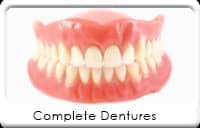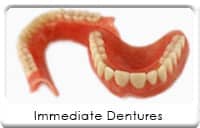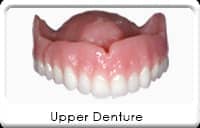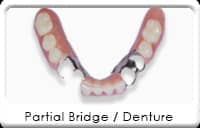There are several types of dentures:
Complete Dentures

Complete dentures are replacements for all of the upper and lower teeth. Denture comfort depends on muscle, bones, tongue, and saliva. Patients begin wearing conventional dentures after the gums heal following any extractions. The advantages of waiting six to eight weeks after healing for dentures are that the dentures will not require a reline or a remake and immediate dentures are not required.
Immediate Dentures

Immediate dentures are placed at the same time that teeth are extracted. They may require additional adjustments after the healing process. It can take months for bone and tissue to stabilize after tooth extractions.
Because shrinkage from bone loss is unpredictable and varies, patients are charged for additional laboratory relines or remake fees.
Upper Denture

Upper dentures tend to be easier for people to adapt to wearing. These are made of the same materials as a complete denture.
Overdentures
Overdentures are a type of conventional denture similar to complete dentures. The difference is that not all teeth are extracted because one or more natural teeth are used to support an overdenture. This type of denture provides greater stabilization during chewing. Overdentures cost more and typically require more dentist appointments for preparation until the procedure is fully complete.
Partial Denture

Partial dentures are designed to replace missing teeth when several teeth are missing. Metal attachments anchor the dentures to your natural teeth. A partial denture is also called a removable dental bridge and helps to maintain tooth alignment by preventing remaining teeth from shifting. With enough permanent teeth, a patient may be a candidate for a fixed dental bridge which is very stable and not removable.
Dentures Overview
Dentures are removable replacements for missing teeth. They are made of acrylic resin and may at times incorporate porcelain or metal for additional structural support. There are two main types of dentures, complete and partial.
Complete dentures and partial dentures are finely crafted and custom-fitted to the patient. Dentures can appear natural and provide a pleasing smile. In addition to their main function of replacing teeth, dentures also help strengthen the muscles used in controlling facial expressions and help correct pronunciation problems caused by missing teeth.
Patients who would like their dentures to look similar to their natural teeth or to achieve the desired shade of tooth color may want to consider custom-designed dentures and/or implant-retained dentures for a superior fit.
Dentures may require the extraction of some teeth so that a proper fit can be achieved to improve functionality.
Dentures Procedure Time Frame
- Time to complete: Doc Kelly can place immediate dentures the same day that teeth are extracted. Fabrication of dentures may take between two to six weeks based on stock or custom design.
- 1st procedure visit - Doc Kelly makes an impression of the existing teeth and surrounding gums which is sent to a dental laboratory so that the denture(s) can be created.
- 2nd visit: Doc Kelly will extract teeth that are designated for removal. Based on the type of denture, placement may be made the same day or some healing time may be required.
- 3rd visit: After some healing time, Doc Kelly will fit and adjust the denture(s).
The procedure time and the extent of preparation required are dependent on the patient's health, the number of extractions required, and whether implants are to be used for implant-retained dentures. The entire process can take several weeks.
Immediate dentures can be created in a lab in about a week and placed in a day. Doc Kelly will help you decide which denture system is the most appropriate for you and provide you with an estimate of how long the procedure will take.
Life-expectancy of dental restorations
- Dentures - up to five years or more
The lifespan of a denture depends on several variables. The type of denture, amount of bone loss a patient experiences, and how hard the patient is on the denture all factor into lifespan and whether the denture will require a reline or remake.
